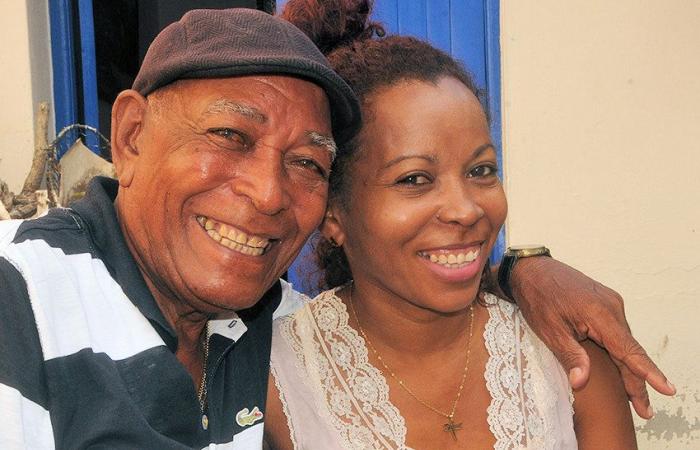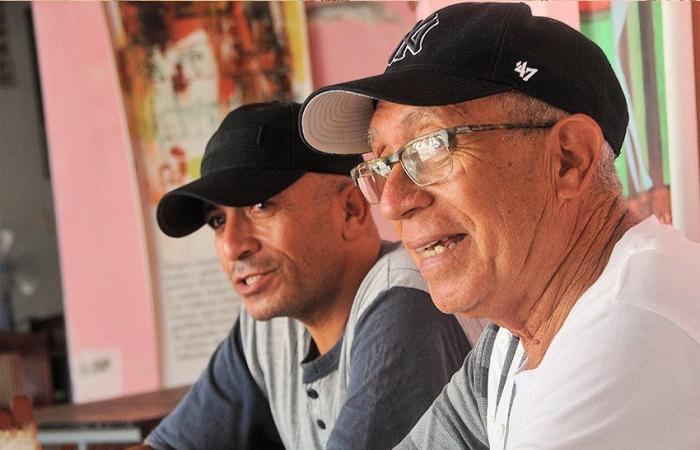– Rolando, father of Rolando Joaquín, Yoanny Celia, Taimí Margarita and Taymara (at his side), a family in which musical tradition is revived.
Las Tunas.- Rolando Portillo Cedeño has been linked to culture for almost 50 years. His eyes reflect the satisfaction of being useful. She knows she is part of a family that has contributed to elevating her. Next to him, his daughter Taymara watches him proudly. “My father is the greatest thing,” she confesses, and her eyes fill with tears.
He, former director of the Cucalambé Original Ensemble and member of other important groups such as the Miramar orchestra, Los Surik, América Latina and the Las Tunas Municipal Band, has cultivated a blood tradition that now extends to his grandchildren. Today he refers to the musical heritage that he embraced from his father, Baldomero Portillo Villadóniga, who – in the early 70s – professionalized the group…, included the trumpet and commanded the group for more than a decade.
“My father was an entrepreneur and a talker. When he gave a nickname, no one could take it away, although for work he was serious. He had the idea of the Hatuey troupe, known as ‘the troupe of the Indians’, he also promoted another called La Alborada Campesina With the Movement of Amateur Artists (MAA) he made a jazz band.
From the age of 8 he defended the demonstration. He started with the tres, studied trumpet, played the tuba, was luthier…He directed brotherhoods such as América Libre (of the MAA). He had the sound inside,” Rolando confesses.
Then, he tells curious anecdotes such as the one in which a piano was brought from another region and those who were transporting it were unaware of the care that the instrument deserves, so they let it get wet in a downpour. But “his old man” repaired it and it was released here, by none other than Bola de Nieve.
Imbued with this admiration for his roots, he comments on the cultural ajiaco that marks his family tree, with grandparents of Spanish and North American descent. “My uncles played instruments. My paternal grandfather liked tap. I grew up in that environment. We are 14 brothers and several of us are inclined towards music.”
One phrase sums up everything: “Musicality has marked my family.” And certainly he marked the path of it. Following the example of his father, he received classes from figures such as Cristino and Eligio Márquez; He integrated Latin American-style casts and consolidated his work until he assumed the direction of the Conjunto Original Cucalambé. Thus, his achievements include recognitions such as the Raúl Gómez García Medal that, according to him, he received in Matanzas along with Rosita Fornés and other cultural greats. Simply unforgettable.
“I am fortunate that part of my descendants love music and defend it in different settings. My son Rolando, for example, is a violinist and works professionally in Trinidad. Taymara, likewise, followed in my footsteps and her daughters show artistic gifts. “I couldn’t be happier,” he confesses.
For the girl, feeling is also emotional. “Dad has always supported me. Thus, I studied at the school of Art Instructors of the province and, inspired by his light, I joined the Cucalambé Original Ensemble. He taught me to love tradition. I owe him a lot. Therefore, although he is retired, I’m still in the group.”
The young singer – in addition – has assumed other functions within culture, serving, first, as a provincial methodologist for Music and, currently, she is the main specialist at the Provincial Center of Houses of Culture. She shares her knowledge with students from the Viajera Peninsular repentismo and tonadas workshop, from the house of the tenth El Cucalambé; with fans of the Tomasa Varona culture house and other talents.
“From my father I have learned discipline, responsibility, love for work and the defense of culture. He always advises me. It is my great pride. The grandchildren, for their part, call him ‘grandpa daddy’; he has earned his love,” he alleges. “It is gratifying that your family follows a positive path in society. My children (four in total) are good people,” adds Rolando.
The Polancos, father and son, plastic artists and great friends.
THE POLANCO, LUMINOUS BRUSHPAKS
“That’s where the alpha comes,” says Gustavo Polanco Montero when he sees his father. I smile at the implicit humor, but I soon understand the complicity that unites them. “More than father and son, we are friends,” emphasizes Polankito, as he is known.
Painting since they were children is something else they have in common, as is having the warm support of their parents. And Gustavo Polanco Hernández also received the helping hand of his father, that baker – now 91 years old – who knew how to appreciate the creative gifts of his childhood child. “He took me when I was young with Rafael Ferrero and Armando Hechavarría. He told them: ‘The boy likes to paint…'”.
Thus, with the impetus of those luminaries, he held a graphic design workshop in Santiago de Cuba. And, along that path, he graduated in Painting and Drawing in Havana, became a member of the Union of Writers and Artists of Cuba (Uneac), worked as a teacher in Artistic Education centers and has left his mark on Las Tunas plastic arts. with gestural painting and its distinctive tones. But the year 1976, without a doubt, would be one of the years that marked him the most. His first son came into his life, the one with whom he shares a name and hobby.
However, he clarifies, both Cheidzé and Gabriela María (the other offspring) also embrace art. “The first of them graduated as an artisan-potter; while the second, self-taught, shows aptitude in plastic arts. And Polankito, my first-born, has painted since he was little. I remember that then I thought about families like the Ochoas or the Márquez, and he told me: ‘Someday my chicks will follow the path of culture.'”
And boy, did his prediction come true! What Polanco Hernández perhaps did not think before is that he would make creations with his son Gustavo, who studied at the then-called El Cucalambé vocational art school and graduated in Ceramics at the Las Tunas Academy of Plastic Arts. Thus, for several years, both have left their mark on murals, group exhibitions and other spaces, such as settings at the Brisas del Caribe hotel (Varadero).
“Being a father is a responsibility,” says Polanco (the oldest). “It’s another way of seeing the world. It’s growing up, acquiring responsibility, loving…”, adds Polanco (son), who knows that sweet sap through Adriana, that baby girl (now young) who would change his life for the better and who Plus, it looks beautiful.
“We must talk to our children, be aware of them. If we distance ourselves, we run the risk of losing them,” says Polankito, who knows perfectly well the sleepless nights that make him remain in balance with the insomniac pupil, after 12:00 am , if the daughter has not yet returned from a party.
Thus, while the two Gustavos are owners of unique styles in painting, they consolidate a peaceful and healthy family, like a luminous brushstroke.







